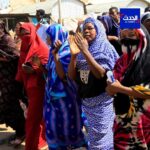The recent surge of violence in North, West, and South Kordofan has intensified a humanitarian catastrophe, but for women and girls, the crisis cuts even deeper. As homes are burned and entire communities displaced, thousands face heightened risks of sexual violence, forced marriage, and life-threatening shortages of reproductive health care. In the besieged areas of El Obeid, Kadugli, and Babanusa, pregnant women cannot reach hospitals, and girls are pulled from school as families flee. With access to basic necessities collapsing and protection systems disintegrating, their lives are not only endangered—they are being erased from view.
In North Kordofan, a devastating offensive occurred in Bara locality between July 10 and 13. The RSF reportedly killed over 300 civilians, including children and pregnant women, in a series of assaults that included mass executions, arson, and looting. Villages such as Shag Alnom and Hilat Hamid were razed, and El Obeid, the state capital, is now besieged from three directions. The siege has led to a collapse in communications and medical services, forcing mass displacement and leaving those who remain without critical aid. Hundreds of families fled the violence in the villages of Bara are struggling to reach safe shelter, majority are living on the open as aid obstruction increased their suffering.
West Kordofan saw substantial territorial losses beginning in early May, when the RSF seized Al-Nuhud and El-Khuwei, severing key aid routes into Darfur. On June 27, fighting erupted in Babanusa, triggering the displacement of 16,000 civilians. In the following days, another 3,200 families fled from El Gantoor and other surrounding areas. The RSF now controls much of the state, including Al-Fulah, while the army retains positions in Babanusa and the Heglig oil fields. These developments have turned the region into a strategic flashpoint. Meanwhile, flooding risks from the rainy season have further hampered aid delivery and raised the threat of waterborne disease. Local groups reported dozens of Cholera cases in Almujlad city and other areas. Women and girls suffering from extreme levels of malnutrition, and lack of access to water. IDPs from villages impacted by the conflict were forced to walk for days to find safe locations, as reports indicated deaths of women and elderlies on the roads to Alfula and Almujlad.
South Kordofan has experienced a deteriorating humanitarian situation marked by territorial shifts and administrative shutdowns. On June 7, forces from both the RSF and the SPLM-N al-Hilu faction captured Um Dehilib, gaining ground east of Kauda. Ongoing fighting around Al Debibat has trapped thousands of civilians, while Kadugli faces intense shelling and blockades. Humanitarian access was severely restricted after Sudan’s Humanitarian Aid Commission suspended 30 national and 3 international NGOs. Roads linking Kadugli to Um Adara, Al Nahlili, and Al Fula have become impassable, cutting off entire communities from food, medicine, and clean water. The state authorities in Kadugli attack on local civil society including arrests of merchants, students and activists. Prices of food skyrocketed in the last month, with limited access to aid. He recent shutdown of the aid groups in South Kordofan increased the levels of famine, especially among women and girls. Women and children reported eating leaves of trees due to the rising famine. The numbers of women and children, pregnant women suffering from sever malnutrition increased. In one village in the road between Kadulgli and Dillinj, local volunteers 60 cases of children suffering from malnutrition in the last 3 weeks.
Urgent action is needed to protect and empower women and girls in Kordofan region and all of Sudan. The stories of women and girls in Kordofan are not statistics. They are survivors of massacre, witnesses of brutality, and caretakers amid chaos.
Humanitarian agencies must prioritize safe corridors for women-led households, ensure emergency access to maternal and reproductive healthcare amid the collapse of the health system. Women and girls need adequate and equal access to food and water, amid rising reports of sexual exploitation and abuse in this region. International actors should pressure for ceasefires that allow rapid aid delivery and support local women’s networks already responding on the ground. Donors must scale up funding for gender-focused responses across Sudan, especially for community kitchens, healthcare, and protection.



